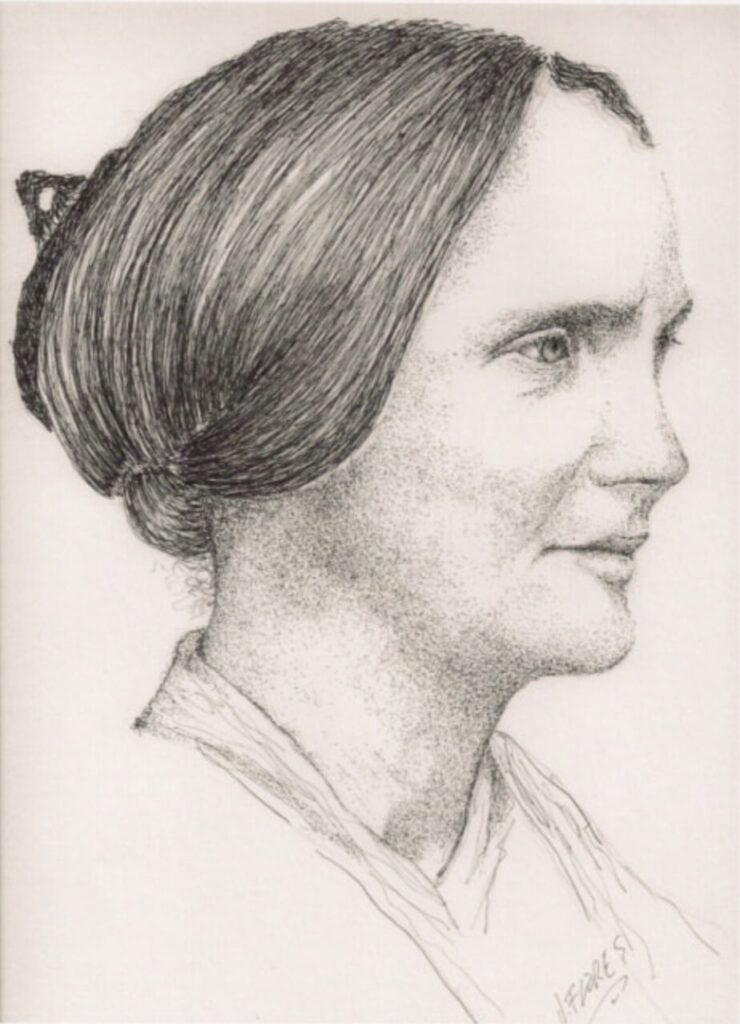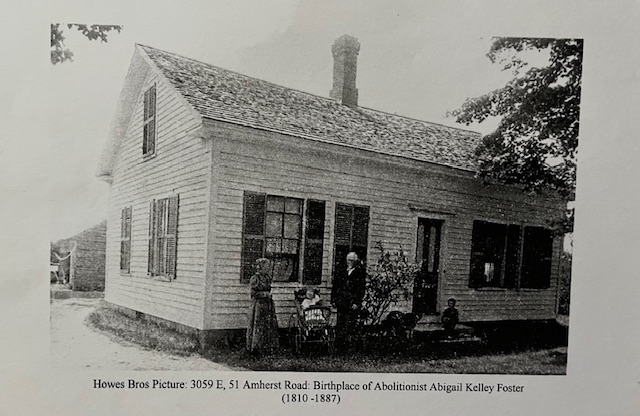Amherst’s Neighboring Towns: Pelham, Massachusetts, (1 of 10)

The house at 51 Amherst Road in Pelham was, in the early 19th century, the home of abolitionist Abby Kelley Foster. Photo: Google Street View
Amherst History Month by Month
Do you ever stop to think that your own life has been touched with glory by association? It might not immediately suggest the topic of historic preservation but bear with me. I have learned that I was house-sitting recently near the birthplace of Abby Kelley Foster (1811-1887) in Pelham. She won’t jump off the page like Susan B. Anthony or Harriet Beecher Stowe but this remarkable abolitionist and equal rights reformer became one of my “sheroes” when I immigrated to this country in the late 1980s. A little older than Anthony (born in Adams, MA) and the same age as Beecher Stowe, Abby Foster is included in the Women’s Hall of Fame in Seneca Falls, NY. One of her most famous speeches for suffrage has the line, “Bloody feet, sisters, have worn smooth the path by which you come hither.”

Voting and our hard-fought for freedoms are on my mind.
Raised in a devout Quaker family, there were no schools of that faith in rural Pelham in the 1820s that Abby or her siblings might attend so she went to Moses Brown School, the Quaker boarding school (founded in 1784) in Providence, Rhode Island that continues to this day. It is not of significance to anyone really but my own family but that means I have had two historic brushes with Abby as it was to Providence that I came from England and where my children were born. I find these kinds of spatial/place-based coincidences very interesting for the wider angles they shed on history.
Abby Kelley (nee Foster) was born on January 15, in 1811, the seventh daughter of Wing and Lydia Diama Kelley who farmed in Pelham at the property now #51 Amherst Road. The single-story home they lived in is not far from the elementary school and the Pelham Library. The single story house has two bays on either side of a central front entrance with a center chimney. It is not absolutely certain that Abby Kelley was born here via deed research but her parents farmed at this homestead until 1820. I wonder if they had access to the stone quarry nearby owned by the Harkness family? My guess, confirmed by the MACRIS (Massachusetts Cultural Resource Information System) listing, is that the modest but well-proportioned house style dates to the Federal era (1776-1820). The Italianate doorframe was added at a later date.
The home first came to my attention as one of a significant collection of mostly rural homes photographed between 1882-1907 by the Howes Brothers (Alvah, Walter and George) who were collectively, a firm of itinerant, commercial photographers who made their studio/office headquarters in Ashfield and in Montague.

Only four complete sets of photos on microfilm exist today, at the Greenfield Community College Library (they have now been moved into the new Greenfield Public Library), the Ashfield Historical Society, the UMass Amherst Library, and the Boston Public Library.
The Howes photographs are usually considered unique portraits of New England families, shown posed outside their homesteads in the late 19th and early 20th centuries, and these date to well after the Kelleys had lived there.
Although she moved away from Pelham as a young adult, Abby continued to surround herself with those of the Quaker faith, eventually becoming engaged to fellow Quaker, Stephen Symonds Foster in 1845. By this time, they lived in Worcester, in a house called Liberty Farm, known to be a part of the Underground Railroad. In addition to abolitionist work, Abby also championed the writings of Amherst Academy alumnus, Sylvester Graham (1794-1851), so-called father of vegetarianism who was a temperance advocate, minister, and food faddist famous for inventing graham crackers.
Note: this is the first in a series about historical and architecturally significant sites in towns and neighborhoods bordering Amherst. I must confess that figuring out exactly which towns to include is a mini-research project, since some historically intact neighborhoods are not actual towns (e.g., Plainville, in Hadley).
If anyone wants to weigh in on this list, please do. You can write to me c/o the Indy at amherstindy@gmail.com with attn: Hetty in the subject line.
1. Plainville, North & East Hadley and Hadley (center) are on Amherst’s border to the west (although do most of us know that Amherst was once a part of East Hadley?)
2. Sunderland (in Franklin county), Cushman, and Factory Hollow (important historic neighborhoods in North Amherst), the Pratt Corner neighborhood and Leverett (Hampshire County) are located to the north of Amherst.
3. The East Village of Amherst, Shutesbury, West Pelham (where Abby Kelley lived), is often generated as a place name in geo-locations for weather and cell phone service and Pelham (center) border to the east.
4. South Amherst and the neighborhood of Dwight , Belchertown, Granby, Mill Valley (Amherst) and South Hadley are to the south of Amherst.
5. Hatfield and the neighborhood specifically of Bradstreet is also a border town to Amherst but the Connecticut River is the real border, perhaps a story all of its very own.

Leverett is in Franklin County
Dear Mr. Nazar:
You are quite correct. Thank you! I think there is a reason that people – not just me – need to be corrected about where Leverett is exactly! (No excuses!) The south part of the town (where the Library is located, for example,) seems to orientate to the south towards Amherst while the north Leverett part of town (full of many interesting historic centers) and closer to the Leverett Food Coop, seems to orientate towards Montague.
Here is a link to the second article about Pelham which doesn’t appear in the drop down menu for the Amherst History articles. It is the one that finished the series about towns around Amherst.
https://www.amherstindy.org/2024/12/20/amhersts-neighboring-towns-pelham-part-2-upon-an-eminence/